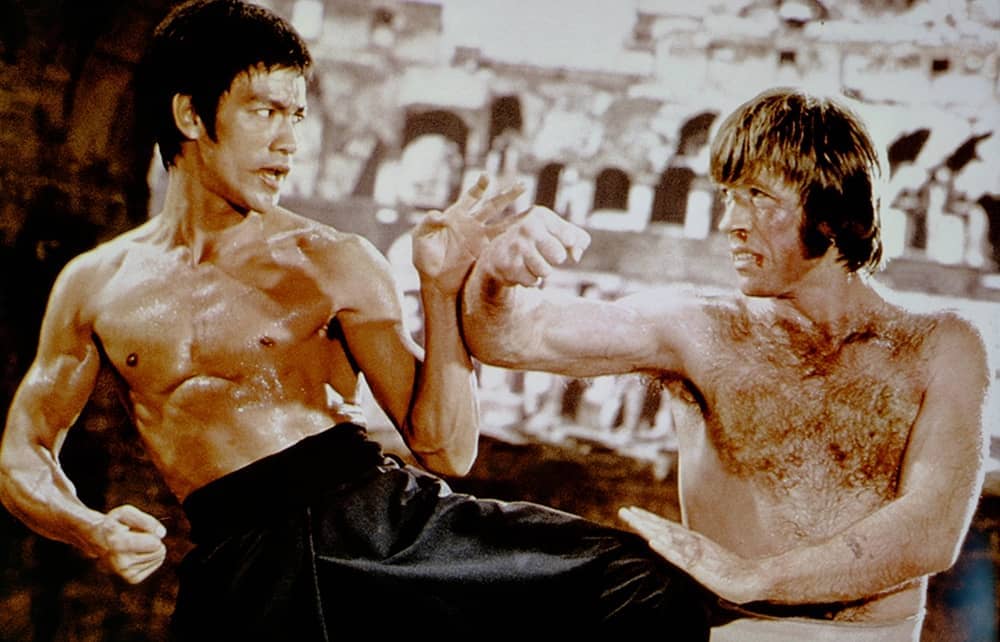Early on in Enter the Dragon our hero, the acrobatic Kung Fu fighter Bruce Lee, tells a young pupil to kick him. Needless to say, the kid’s kick comes a cropper. ‘What was that?’, Lee sneers, clipping the lad’s ear. ‘An exhibition? We need emotional content, not anger.’
Even at 12, when I first read about this scene (in the poster magazine Kung Fu Monthly, whose first 26 issues are handsomely reproduced in Volume I of Carl Fox’s Archive Series), I thought it sounded like a load of chop suey hooey. An exhibition is precisely what I’d have wanted, if by some miracle I could have wise-guyed my way into seeing Lee’s X-rated picture. Anyway, if anger isn’t an emotion, what is it? And if I’d needed any cod philosophising, I could have got it from my elder brother’s NME, thank you very much.
For a man who liked to break bricks with his bonce, Bruce Lee was no bonehead
But here we are, coming up to half a century since Lee’s early death (at 32 – from drugs, heatstroke, extra-marital nooky etc), and Daryl Joji Maeda, a professor of ethnic studies at Boulder University, Colorado, wants us to know that this guy was a thinker who ‘embraced Buddhist, Taoist and Confucian philosophies’. That’s right: Lee’s legacy isn’t just a handful of dopey fight flicks. The Little Dragon was as much a Heidegger as a high-kicker.
Then again, for a man who liked to break bricks with his bonce, Lee was no bonehead. Maeda has been through the notebooks Lee kept as a philosophy student at the University of Washington, and they’re not unimpressive. If Lee’s dismissal of Descartes isn’t quite final, nor is it merely fatuous. Lee had no time for dualism. The only mind-body problem that mattered to him was the one about blocking out thought so as to let the arm or leg do what needs to be done. Just as happiness, for everyone from the Buddha to Mill by way of Schopenhauer, means forsaking the self and its desires, so you achieve more on the field or in the ring when you stop playing the game and let the game play itself through you. Hence the advice Lee gave all his fighter pupils – among them Roman Polanski, James Coburn and Steve McQueen – that gives Maeda the title for his book: ‘Be like water… formless, shapeless, insubstantial.’
Alas, Lee could push his anti-rationalist schtick too far. Early on in his Kung Fu training, a teacher introduced him to the thought of Lao Tzu. What Lee got from it was the principle of yin and yang: the idea that forces can be both opposed to, and complementary of, one another. It’s a pretty – and pretty useful – notion, though Maeda too readily swallows the undergraduate Lee’s claim that it negates Aquinas’s argument from contingency. As Lao Tzu would surely have asked, mightn’t St Thomas and I both have a point?
As for Maeda himself, he’s a thoroughgoing Hegelian. Though Like Water is really just another biography, it’s gussied up with sweeping historicist backdrops. Before you get to its ostensible subject you have to jab and chop your way through a 40-page introductory section on ‘Transpacific currents’. Three such currents, ‘commercial and racial crossings, Cantonese opera and Chinese cinema, intertwined to create the conditions that led to Bruce Lee’s birth in San Francisco’. Well, yeah. But lots of Asian people have been born in ’Frisco and only one of them became the most famous martial artist of all time.
For all his emphasis on dialectics and genealogy, Maeda fails to grasp how tethered to the cultural moment of the early 1970s Lee’s short-lived fame was. As Luke White makes plain in his solemn but spirited Fighting Without Fighting, the Kung Fu craze owed far more to countercultural revolt than to oriental caroling. Lee was a by-product of one of the essential 1960s fantasies – the ponderous belief in the innate superiority of all things eastern.
At the same time, he was part of that very 1970s cult of hermaphroditism. In Marlowe, the movie version of Raymond Chandler’s The Little Sister, James Garner’s titular hero goads Lee’s villain about his bedroom habits: ‘You’re light on your feet, Winslow – are you just a little gay?’ No he wasn’t, though he was as camp as a purple plush pagoda. As Maeda reminds us, the young Bruce had been a dancer who earned a good living teaching the cha-cha. He took those skills with him to the movies. Like most great stars – Cagney, Cary, Connery – he moved beautifully. For all their bone-cracking violence, his fight scenes had a celestial grace. There are times, watching Lee whirl around Chuck Norris or back-flipping while kicking Bob Wall in the nose, when you might fancy yourself watching Fred and Ginger at work. Mind you, if you’d told my 12-year-old self that, I’d have kicked you from here to kingdom come.






Comments